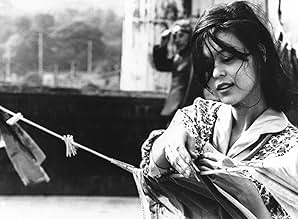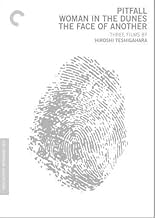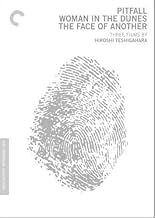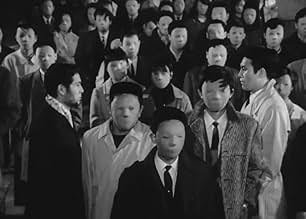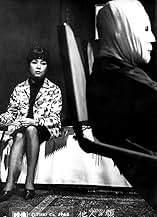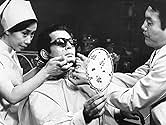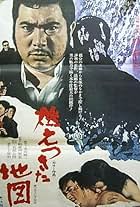Homem perde o rosto em um acidente e temendo o fim de seu casamento decide procurar um ousado cirurgião que acaba de inventar um método de transplante de rosto. O problema é encontrar alguém... Ler tudoHomem perde o rosto em um acidente e temendo o fim de seu casamento decide procurar um ousado cirurgião que acaba de inventar um método de transplante de rosto. O problema é encontrar alguém que doará sua face.Homem perde o rosto em um acidente e temendo o fim de seu casamento decide procurar um ousado cirurgião que acaba de inventar um método de transplante de rosto. O problema é encontrar alguém que doará sua face.
- Prêmios
- 2 vitórias no total
- Foreign man in Bar
- (não creditado)
Avaliações em destaque
I saw "The Face of Another" (Tanin no kao) at the National Gallery of Art's series, "A New Wave in Japan: 1955-1974," and was mesmerized by this "elegantly spooky and enigmatic examination of identity." This is the third of four Hiroshi Teshigahara (director)/Kobo Abe (writer)/ Toru Takemistu (composer) collaborations. They have reached nearly the same perfection in the fusion of image, sound, and subject in this work as in their brilliant work, "Woman in the Dunes."
A businessman (Tatsuya Nakadai), whose face has been scarred in an industrial fire, is receiving psychotherapy from a psychiatrist (Mikijiro Hira). He succeeds in persuading the psychiatrist to make a mask for him, amazingly lifelike but completely different from his own face. Soon after being fitted for the mask, he tries to seduce his wife (Machiko Kyo) and succeeds; she promptly falls for the handsome stranger. He becomes angry at her weakness for a handsome man, but she claims she was aware all along that he was her husband and believed that both were just masquerading together as most couples usually do in different ways. She tells him that it is not she but he who has worried excessively about his appearance and who has spoiled his relationship with others. Strangely enough, his personality seemingly begins to change after he puts on the mask as if the mask has influenced his personality. And, he comes to realize that his new identity does not enable him to reintegrate into society after all.
The film also has a touching subplot. A good-natured young woman (Miki Irie, now Mrs. Seiji Ozawa), the left side of whose face is beautiful, but the right side of which is disfigured, has been hurt by others' inquisitive eyes and insults. She has been shunned and never been treated as a lady by any man other than her older brother. One day, she and her brother take a trip to a seaside resort, and in the hotel, she asks him to make love to her, hiding from him the intention of killing herself the next morning. He accepts her surprising request. During the lovemaking, he kisses her on the right side of her face. Her brother is the only man who can understand her pain and solitude and who can love the ugliest part of her appearance because of his deep love for her.
After seeing this film, questions arise. What is Identity? How is it established? What is the relationship among Identity, Personality, and Physical Appearance? Does Personality determine Physical Appearance? Or, does Physical Appearance determine Personality? Abe and Teshigahara seem to challenge our common beliefs about this.
The story is easy to follow, unlike "Woman in the Dunes." The dialogue is sophisticated enough as to be quotable.
Takemitsu's musical score is outstanding. He has created a sharp contrast between sweet, sad music, which represents dance music for the masquerade, and deep, eerie "music," which represents the reality of faceless people.
I hope this film will enjoy a revival and come to video or DVD in the near future.
The Face of Another is a fascinating film that highlights the social attitudes to physical appearance. There are hundreds of films and morality tales that teach you that it is inner beauty that counts, and once you allow this to shine then your physical attractiveness becomes irrelevant. Everyone knows that this is bullshit, so its refreshing to see a film that makes it clear from the outset that physical appearance has a massive part to play in society. Okuyama's new face, which is an attractive one, changes him so much that he takes on an almost dual identity. Dr. Hira delights in telling him that he has bought flashy new clothes, something he was never concerned with before. It becomes clear that whilst before Okuyama merely wanted to be normal again and fit back in society, his new face is engulfing him, and to be 'normal' simply isn't enough anymore.
As with many of the Japanese New Wave film-makers of the 1960's-70's, director Hiroshi Teshigahara takes some bold steps and sneaks in some surrealist and art-house values in a movie that is otherwise played relatively straight. A 'fictional' character appears every now and then throughout (she is first imagined by Okuyama's wife as a character in a movie); one side of her face is scarred and burned. She appears quite rarely, but seems to serve as an alternative to Okuyama's increasingly vain soul. Another scene seems a ball of hair that floats in the air, unnoticed by the people in the laboratory. I have no idea what it meant, and couldn't really admit to it being wholly successful, but it certainly got my attention nonetheless.
A powerful, disturbing, and poignant drama/horror from the greatest era in Japanese cinema. The film seems all the more important now, 45 years on, in a world where a botox injection can be as easy as buying a pack of cigarettes, and where physical 'beauty' is less a bonus than a necessity.
www.the-wrath-of-blog.blogspot.com
A fascinating piece of film making that has many layers and interpretations. For me, I see Mr. Okuyama representing post war Japan, the accident that removes his features the raw wound of two atomic bombs, the bandages a place to hide while the country considers its future and the new face, the new Japan, that finds a way to integrate itself into a modern world, while holding on to traditions and cultures that take a little more time to retune as the situation clarifies. Any film with Machiko Kyô performing is always a bonus too.
Você sabia?
- CuriosidadesDirector Hiroshi Teshigahara said that he intended the film to explore both personal and cultural identities. While the examination of personal identity is quite overt, Teshigahara also explored how Japan's cultural identity had been impacted by World War II and its aftermath.
- Citações
Psychiatrist: You're not the only lonely man. Being free always involves being lonely. Just there is a mask you can peel off and another you can not.
- ConexõesReferenced in O Funeral das Rosas (1969)
Principais escolhas
- How long is The Face of Another?Fornecido pela Alexa
Detalhes
Bilheteria
- Faturamento bruto mundial
- US$ 35.185
- Tempo de duração2 horas 2 minutos
- Cor
- Mixagem de som
- Proporção
- 1.33 : 1
Contribua para esta página




